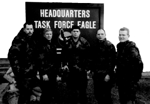The 1990's
With the end of the Cold War, defense intelligence began a period of reevaluation following the fall of Communism in many of the East European countries, the reunification of Germany, and ongoing economic reforms in the region. During this phase, DIA emphasized improved management of intelligence production, DoD-wide, as resource reductions once again threatened to negatively impact Agency objectives and manpower. Organizationally, DIA adopted the concept of functional management to better address U&S Command intelligence issues. The Assistant Secretary of Defense (Command, Control, Communications, and Intelligence) was given expanded authority, direction, and control over DIA, and the Agency's Deputy Director's position was made civilian.
In response to Iraq's invasion of Kuwait in August 1990, DIA set up an extensive, 24-hour, crisis management cell designed to tailor national-level intelligence support to the coalition forces assembled to expel Iraq from Kuwait. By the time Operation DESERT STORM began, some 2,000 Agency personnel were involved in the intelligence support effort. Most of them associated in some way with the national-level Joint Intelligence Center (JIC), which DIA established in the Pentagon to integrate the intelligence being produced throughout the Community. DIA sent more than 100 employees into the Kuwaiti Theater of Operations to provide intelligence support, and deployed 11 National Military Support Teams overseas.
After-action reports later confirmed that no combat commander had ever benefitted from as full and complete a view of an adversary as U.S. and coalition commanders did prior to and during DESERT STORM. This DIA-led effort remains one of the greatest examples of intelligence support to operational forces in modern times. For its achievements during the crisis and conflict, DIA earned a second DoD Joint Meritorious Unit Award. The Chairman of the Joint Chiefs of Staff, General Colin L. Powell, attached the appropriate streamer to the DIA flag in a special outdoor ceremony at the DIAC on 26 June 1991.
The Armed Forces Medical Intelligence Center (AFMIC), and the Missile and Space Intelligence Center (MSIC), associated with the Army for over 20 and 40 years respectively, became part of DIA in January 1992. This was pert of the continuing effort to consolidate intelligence production and make it more efficient.
An Intelligence Sucess Story
"No combat commander has ever had as full and complete a view of his adversary as did our field commander. Intelligence support to Operations DESERT SHIELD and DESERT STORM was a success story"
General Colin Powell, 1991
The most fundamental reexamination of U.S. national security policy since the 1940s--precipitated by the end of the Cold War--compelled a widespread review of DIA's role as the Intelligence Community confronted the twin challenges of a new era of regional conflict and simultaneous reductions in U.S. defense spending.
With intelligence requirements escalating sharply, DIA undertook one of the most profound reorganizations in its history in 1993. This restructuring essentially rebuilt the Agency from the bottom up, and in the process enhanced flexibility, improved cooperation with the Service intelligence organizations, severely reduced management overhead, and returned to the basics by focusing on the common intelligence functional areas of collection, production, and infrastructure.
As DIA moved toward institutionalizing the process underlying the reorganization, it became clear that the restructuring had already brought about an unprecedented level of integration among DIA, the Military Services, and the Combatant Commands. This served the Community well as it surged to provide intelligence support to U.S. and United Nations forces involved in places such as Somalia, the former Yugoslavia, and Haiti. In 1994, DIA received an unprecedented third Joint Meritorious Unit Award for intelligence support during these crises.
The newly formed Defense HUMINT Service (DHS) achieved its initial operating capability on 1 October 1995. DHS will consolidate the HUMINT activities of all the Services under the umbrella of DIA. This new organization reflects the driving need to consolidate and focus our downsized resources to maximize the effectiveness of reduced assets.
JPEG
 (262.7 Kbytes)
(262.7 Kbytes)
The Patriot's Memorial at the DIAC, dedicated to the men and women who have paid the ultimate price in service to their Country and the Defense Intelligence Agency.
Today, DIA continues to build on its proud traditions and stands as the Nation's preeminent military intelligence organization. Most importantly, the Agency's many professionals around the globe remain, as in the words of its motto, "Committed to Excellence in Defense of the Nation."
"I only regret that I have but one life to lose for my country"
Capt Nathan Hale, 1776
 (57.7 Kbytes)
(57.7 Kbytes) (57.7 Kbytes)
(57.7 Kbytes) (132.3 Kbytes)
(132.3 Kbytes) (64.5 Kbytes)
(64.5 Kbytes) (262.7 Kbytes)
(262.7 Kbytes)